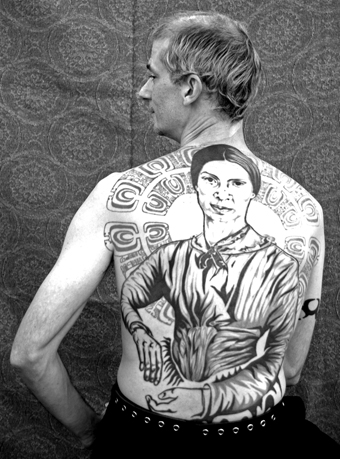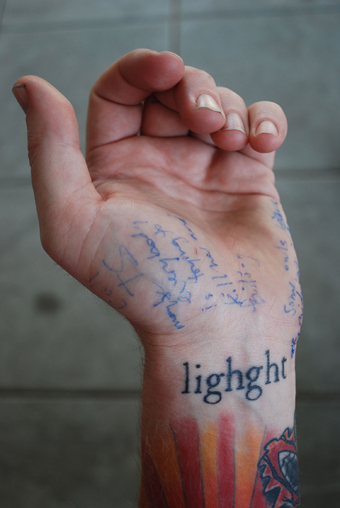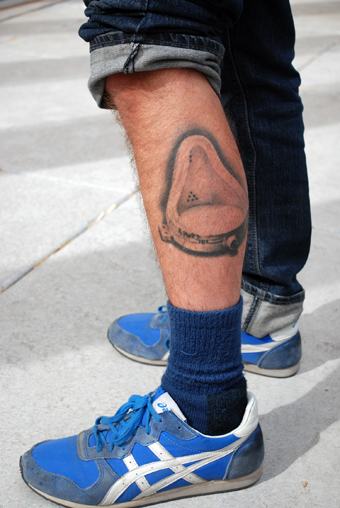Adapt a Fairy Tale
Write a contemporary adaptation of a fairy tale using first-person narration from the point of view of the villain.
Jump to navigation Skip to content
Write a contemporary adaptation of a fairy tale using first-person narration from the point of view of the villain.
Last night, during a ceremony at the New School’s Tishman Auditorium in New York City, the National Book Critics Circle announced the recipients of its book awards for publishing year 2012.
D. A. Powell won in poetry for Useless Landscape, or A Guide for Boys (Graywolf); Ben Fountain won in fiction for Billy Lynn’s Long Halftime Walk (Ecco); and Andrew Solomon won in nonfiction for Far From the Tree: Parents, Children, and the Search for Identity (Scribner).
Leanne Shapton won the autobiography award for Swimming Studies (Blue Rider Press); Robert A. Caro won the biography award with The Passage of Power: The Years of Lyndon Johnson (Knopf); and Marina Warner won the criticism award for Stranger Magic: Charmed States and the Arabian Nights (Belknap Press).
The winners were chosen by a panel of established literary critics from a list of thirty finalists announced this past January. The shortlist in poetry included David Ferry for Bewilderment: New Poems and Translations (University of Chicago Press); Lucia Perillo for On the Spectrum of Possible Deaths (Copper Canyon Press); Allan Peterson for Fragile Acts (McSweeney’s Books); and A. E. Stallings for Olives (Triquarterly). The finalists in fiction were Laurent Binet for HHhH, translated by Sam Taylor (Farrar, Straus and Giroux); Adam Johnson for The Orphan Master’s Son (Random House); Lydia Millet for Magnificence (W. W. Norton); and Zadie Smith for NW (The Penguin Press).
The annual National Book Critics Circle awards are given for books published in the previous year. For more information about the awards, visit the NBCC website.
In the video below, watch the finalists read from their work at last night’s ceremony.
For your viewing pleasure we present this 1963 documentary Ray Bradbury: Story of a Writer, produced and directed by Terry Sanders, in which the late science fiction author (who was forty-three when the film was made) shares his thoughts on writing and perseverance: "You've got to be inspired and mad and excited and love it more than anything else in the world!"
The Unchangeable Spots of Leopards, Kristopher Jansma's debut novel, forthcoming in March from Viking, takes readers around the world—to the rocky edge of the Grand Canyon, the posh hotels of Dubai, the crowded markets of Kumasi, and an abandoned Icelandic writer’s colony—with its elusive narrator and his two friends: the talented but unstable Julian McGann and the beautiful actress, Evelyn Demont.
The 2013 Susan Sontag Prize for Translation will award a grant of $5,000 for a proposed work of literary translation from French into English by a translator under the age of thirty. The deadline for applications is April 12.
The grant will be awarded in late June, and the translation must be completed by November. Eligible works include novellas, plays, and collections of poetry, short stories, or letters originally written in French. Applicants wishing to translate longer works should contact the Susan Sontag Foundation before applying so that supplementary materials can be included. Preference will be given to works that have not been previously translated.
Translators may submit a five-page sample translation of the proposed work and the same passage in the original language, along with the required application form, a personal statement, a project proposal outlining the work and describing its importance, a bibliography of the author, one academic letter of recommendation, and an official transcript from a current or most recent academic institution. Applications must be submitted via postal mail to the Susan Sontag Foundation , 76 Franklin St. #3, New York, NY 10013. Visit the website for complete submission guidelines.
The winner will be notified in late June, and results will be announced on the Susan Sontag Foundation website. The winner will also be expected to participate in symposia on literary translation with established writers and translators, and give public readings of their work once the translation has been completed.
The 2012 prize was split between Julia Powers and Adam Morris, who translated Contos d'escárnio/Textos grotescos and Com os meus olhos de cão, respectively, by the Brazillian poet and novelist Hilda Hilst. The 2011 prize winner was Chenxin Jiang, for her translation from the Italian of Destino Coatto, a series of prose vignettes by Goliarda Sapienza.
The Susan Sontag Foundation Translation Prize was established in honor of Susan Sontag, who devoted much of her life’s work to championing literary translation. The prize, given annually in alternating languages, seeks to increase the practice and recognition of translation in the United States. For more information about the prize or the foundation, visit the website.
Dialogue, when it’s working well, moves the story forward and more fully develops your characters. Keeping this in mind, write a scene for a story that is only dialogue between two characters. Let what the characters say reveal the plot and their personalities and motives.
Cybele Knowles works as a program coordinator at the University of Arizona Poetry Center, where she coordinates the PW-funded Center’s Reading and Lecture Series, Classes & Workshops program, and Closer Look Book Club. She holds an MFA in fiction from the University of Arizona and an MA in English from U.C. Berkeley. Her poetry and prose have appeared in the Destroyer, Spiral Orb, Diagram, Pindeldyboz, the Asian Pacific American Journal, Faucheuse, and the Prose Poem.
In my final post, I’ll share some homage tattoos spied in and around the University of Arizona Poetry Center. These tattoos reference poets, writers, artists, and artworks that have a special significance to the wearer.
My interest in such tattoos originated when poet Philip Jenks came to Tucson in 2010 to appear in our Reading and Lecture Series, a program supported by the Poets & Writers Readings/Workshops program. I knew about Philip’s fabulous tattoo of Emily Dickinson, and asked him if I could take a picture of it. He was gracious enough to allow me to capture his Emily in all her glory.

This is a powerful Emily Dickinson, with large hands and a tribal halo. Philip also chose to depict Emily as she might have looked in her later years (the only known photos of Emily are from when she was very young). As you can imagine, encountering Philip and his Emily sparked in me an interest in other tattoos that reference loved writers, artists, and artworks. It turns out that such tattoos are everywhere at the Poetry Center, on the bodies of our visitors, volunteers, colleagues, friends, and patrons. Here are just a few homage tattoos I’ve discovered at the Poetry Center. With each image is a statement from the wearer about the origin, history, or personal significance of the tattoo.
Zachary Schomburg: Poet, Editor, and Poetry Center Visiting Poet (October 2012).

“Much of the history of this Aram Saroyan poem was spent at the center of political controversy over the value of public funding for the arts, but now it represents more of a marker of that successful resistance. This tattoo then embodies not only my commitment to poetry, this unbound experiment of language that the poem itself embodies, but also its defense. Plus, it is an entire poem I can fit on my wrist. I’m sure I’m one of many with this poem on my body, but I wear it also in unison with two of my good friends, Mathias Svalina and Joshua Marie Wilkinson. We share a Frank Stanford line too. I’m developing this compulsion of wanting to be completely covered with language and images. Tattoos and pens. I like writing on myself. When I write on myself with a pen, it quickly disappears. Without this particular photo, I wouldn’t have ever remembered writing that scribble on my hand. I think it says, ‘Maybe everybody is trying to kill me and failing.’ I don’t know if I ever called TS. Who is TS? Some owls? My fingernails are dirty.”
Kate Bernheimer: Writer, Editor, and Poetry Center Colleague/Teacher/Friend.

“I used to live in Portland, Oregon, and every winter I would come spend around a month in the Tucson Mountains, out near the Arizona-Sonora Desert Museum, at my friend Lydia Millet’s place. I had to get out of the rain and I revere the high desert. Lydia had renovated what was basically a trailer into a compound of sorts and had space for a guest among the many creatures and incredible botany there. We would work from sunrise to sunset—we would write for more than eight hours, it was serious bliss—and then we would have drinks in her kitchen with the lights out and watch javelinas feast on a quail block. As we wrote, I could hear Lydia chortling at her computer at the other end of the house. Her laughter carried me through the end of my first two novels. In 2000, the year she wrote My Happy Life (and chortled through it, which is hilarious because it’s a terribly heartbreaking book), I completed The Complete Tales of Ketzia Gold. The day I finished the novel, we drove over Gate’s Pass into downtown Tucson and I got my tattoo on Fourth Avenue after having a vodka and soda at Plush, though I’m not sure if it was called Plush at the time. I think so. I had just the one drink, I wasn’t drunk. I had planned on getting a tattoo of the word ‘Mom’ written inside a winged heart, to match Lydia’s, but at the last minute I decided on the angel with chicken feet. The tattoo is a version of an illustration by Alexander Alexeieff that appears on the title page of Russian Fairy Tales, collected by Aleksandr Afanasev and translated by Norbert Guterman. She also appears in The Complete Tales of Ketzia Gold—a description of her, not a picture. Portions of the novel are based on the tales in that book, and I had the book with me when we left Lydia’s spread in the desert and went into town. I pretty much took it everywhere I went, at the time, along with a collection of Brothers Grimm tales. Both have now completely fallen apart.”
TC Tolbert: Poet, Assistant Director of Casa Libre en la Solana, and Poetry Center Friend.

“I got this tattoo of Marcel Duchamp’s Fountain just as I was beginning my gender transition from female to something less visibly female (also often called male but, unlike many trans folks, I don’t identify as male, I identify as trans—anyway). At the time I was in grad school for poetry, reading Poems for the Millennium, and it was Mallarmé, then Dada, that gave me a poetic lens for my body. And, in turn, my (trans and genderqueer) body gave me a physical/spatial lens for my poetic work. It is not an exaggeration to say that I transitioned partly because the avant-gardes (plural, as Richard Kostelanetz points out) gave me permission to interrupt the narrative, the confidence to experiment with form. Trans and queer coming-out stories are important to me, but even more encouraging, and less prescriptive, has been the work of Gertrude Stein, Stéphane Mallarmé, Marcel Duchamp, Trisha Brown, Shen Wei, and C.D. Wright. Fountain embodies Cage’s dictum: It’s lighter than you think. I needed that. I still do. To remember that my body (my bodies) is (are) a readymade—that I actually have very little idea of the different things it is, it can become, it can do. It’s also fascinating to see how different people read the piece. Among the many guesses: an athletic cup (jock strap), a regular old urinal, a hunk of roast beef, a steak. Judith Butler says that one ‘exists’ not only by virtue of being recognized, but, in a prior sense, by being recognizable. So too for the trans body, the experimental poem.”
Cameron Louie: Poet and Poetry Center Advisory Board Member.

“Ad astra per alas porci: ‘to the stars on the wings of a pig.’ The Pigasus is, in a sense, John Steinbeck’s truest signature. It symbolized him, and I think it symbolizes all of us who try at writing, as ‘lumbering souls but trying to fly.’ It is an impossible thing, and imaginary. Most importantly, while riding the Pigasus, one gains the gift of poesy...”
Adam Kullberg: Nonfiction Writer and Poetry Center Volunteer.

“I didn’t read Ray Bradbury’s The Martian Chronicles, on which this tattoo was based, until I was in my early 20s. But when I did I found myself fascinated with his use of the Martian landscape—a place I viewed as foreign, lifeless—to convey the beauty, as well as the ugliness, of the world in which I lived. I meant for this tattoo, through its watercolor style and surreal landscape, to convey one of the strengths I find in all of Bradbury’s short stories and novels: that he speaks to both the artist and the child, the ordinary and the fantastic, the real and the magical, that are tethered to each of us.”
Mike Powell: Fiction Writer and Poetry Center Volunteer.

“This tattoo is of a muted post horn, the symbol of an underground mail-delivery service in Thomas Pynchon’s The Crying of Lot 49. I got it when I was 19 or 20 in a strip mall next to a sushi restaurant near the edge of Charlottesville, Virginia. I imagine that some people get tattoos of images they think are singular or uniquely expressive. Part of the reason for getting this tattoo is precisely that I knew other people who already had it: friends of friends of friends, cousins of friends of friends, strangers I’d met at parties. It wasn’t a mark of separation, but of connection. Plus, while I’m not particularly attached to physical mail or mail delivery, I liked the idea that the symbol belonged to an underground mail-delivery service, which seemed like an elegant metaphor for both the romantic appeal of subculture but also the superfluity of it. (The USPS has always served me just fine.) Twice or so a year, I meet people with the same tattoo. I’d be lying if I said it brought me closer to them, necessarily. Not all groups are predicated on spiritual kinship. For these people I reserve a quiet smile, and take heart in the idea that we know something, however irrelevant, that other people don’t. (My other tattoo is of the now-extinct Tasmanian tiger.)”
Laura Miller: Fiction Writer and Poetry Center Volunteer.

“When I was feeling as if I’d never be a legitimate writer, a Steinbeck or a Chekhov, science fiction showed me the writer’s imagination cracked open on the page and gave me a way forward. This tattoo is from the first science fiction film, Le Voyage dans la Lune, and I love the harshness of the film: the un-romanticized depiction of space, the moon-image characterizing man’s capacity for destruction. I worked closely with the tattoo artist to retain that gruesome quality. The moon paradox, a symbol of darkness, of mother, of spiritual guidance, is something I think about a great deal in my fiction. Moons have—since childhood—haunted me.”
Thanks to Philip, Zach, Kate, TC, Cameron, Adam, Mike, and Laura for sharing their homage tattoos, some of their favorite authors and artists, and their stories with me!
Photo Credit: Cybele Knowles.
Support for Readings/Workshops events in Tucson is provided by an endowment established with generous contributions from the Poets & Writers Board of Directors and others. Additional support comes from the Friends of Poets & Writers.
Appearing at Cornell University in 2009, the author reads from "The Starlight on Idaho," a short story originally published in Playboy in 2007. Johnson's latest novel, Train Dreams (FSG), was a finalist for the 2011 Pulitzer Prize in Fiction.
The finalists for the thirty-third annual Los Angeles Times Book Prizes, given in ten categories for books published in 2012, were announced today.
The finalists in poetry are Louise Glück for Poems: 1962-2012 (Farrar, Straus and Giroux), Rowan Ricardo Phillips for The Ground: Poems (Farrar, Straus and Giroux), D. A. Powell for Useless Landscape, or A Guide for Boys: Poems (Graywolf Press) Bin Ramke for Aerial (Omnidawn), and Cole Swensen for Gravesend (University of California Press).
The finalists in fiction are Jami Attenberg for The Middlesteins: A Novel (Grand Central Publishing), Michael Chabon for Telegraph Avenue (Harper), Ben Fountain for Billy Lynn's Long Halftime Walk (Ecco), Lauren Groff for Arcadia (Voice/Hyperion), and Lydia Millet for Magnificence (Norton).
The finalists for the Art Seidenbaum Award for First Fiction are David Abrams for Fobbit (Black Cat/Grove/Atlantic,Inc.), Kevin P. Keating for The Natural Order of Things (Aqueous Books), Lydia Netzer for Shine Shine Shine (St. Martin's Press), Maggie Shipstead for Seating Arrangements (Knopf), and Robin Sloan for Mr. Penumbra's 24-Hour Book Store: A Novel (Farrar, Straus and Giroux).
For embracing new electronic forms of narrative, novelist Margaret Atwood will receive the Times Innovator's Award. Atwood’s recent projects include writing a serialized e-book for Byliner and posting her work on the collaborative writing website Wattpad. A new award series hosted by Wattpad, the Attys, whose inaugural winners were recently announced, were named in Atwood’s honor.
The winners of the 2012 book prizes will be announced at an awards ceremony on April 19 at the University of Southern California. The ceremony is open to the public; tickets will be available in late March. For more information on the event, and for a list of finalists in the additional award categories of biography, current interest, graphic novel/comics, history, mystery/thriller, science and technology, and young adult literature, visit the L.A. Times Book Prizes website.
"If you've ever tried to make a student loan payment with a credit card and you find out the loan and the credit card are issued by the same bank, I think you'll understand the characters in this book," says Jim Gavin about his debut story collection, Middle Men (Simon & Schuster). For this and other new and noteable books, check out this issue's Page One.